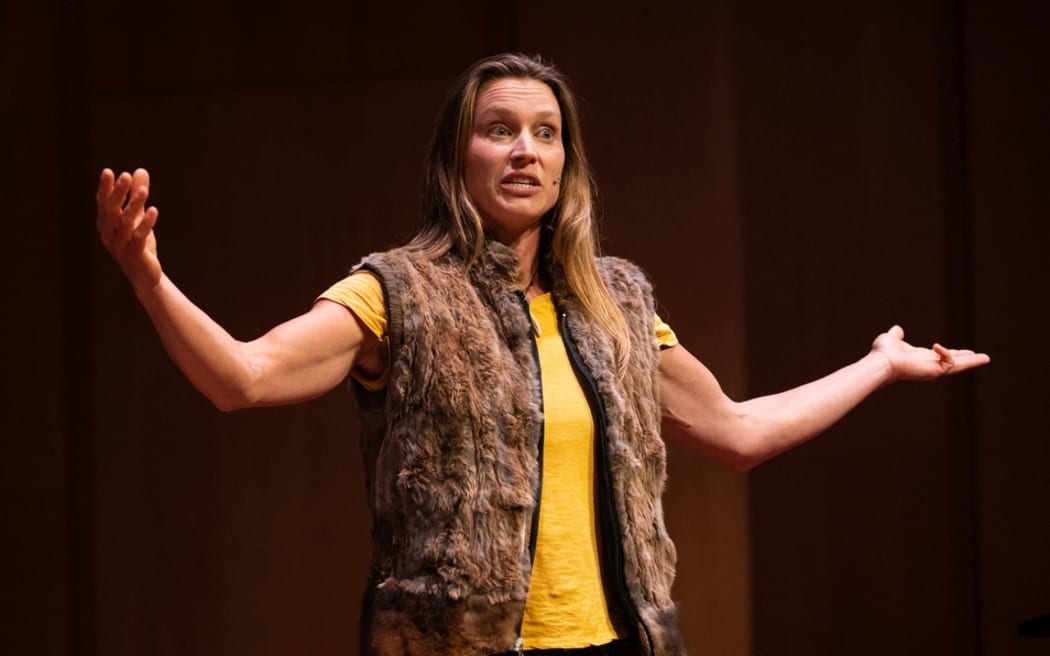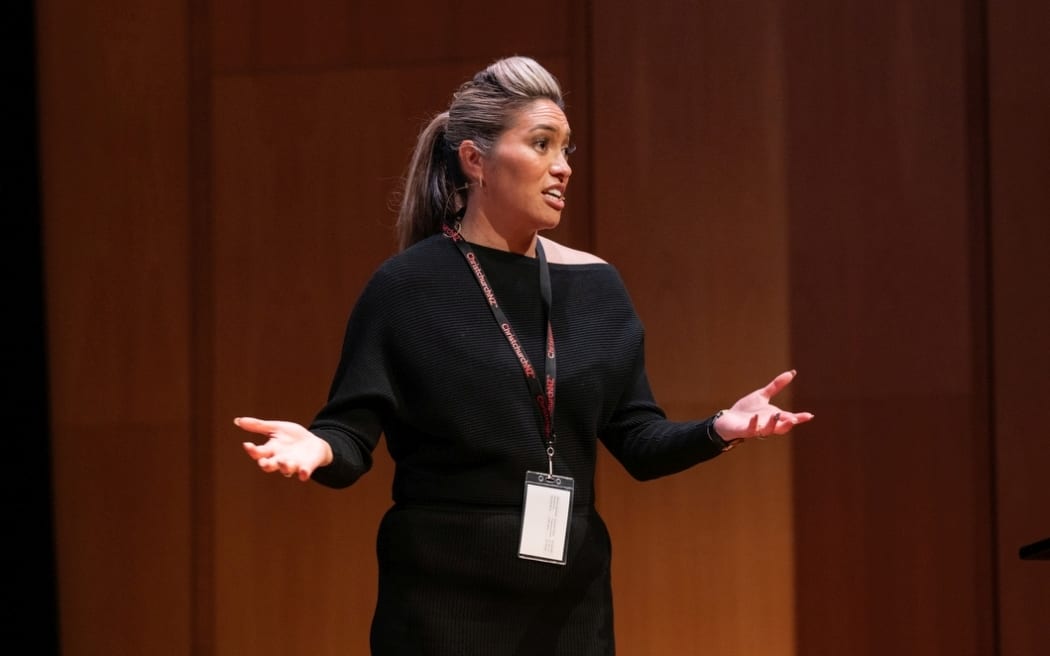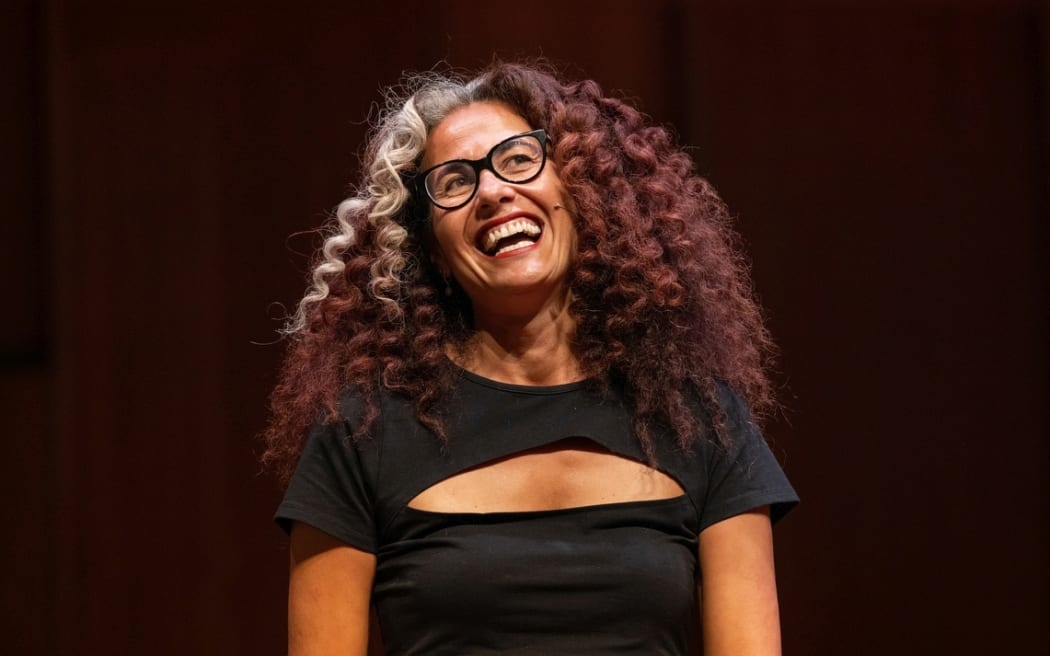
Selena Tusitala-Marsh, Annabel Langbein, Kaiora Tipene, Miriam Lancewood and Miriama Kamo Photo: WORD Christchurch
Highlights of the panel discussion
Four women tell stories from their adventurous lives in this event which launched the 2020 Word Christchurch Spring Festival in October: Kaiora Tipene, one half of the Netflix duo The Casketeers; Selina Tusitala Marsh, former Poet Laureate and author of Mophead; Annabel Langbein, celebrity cookbook author and adventurer; and Miriam Lancewood, author of Woman in the Wilderness, hosted by broadcaster Miriama Kamo

Miriam Lancewood Photo: WORD Christchurch
Miriam Lancewood and her husband have for much of their life together been nomadic. Literally. Living in the bush, eating what they can kill, with no place to call home.
“We feel we live a very free life,” she says. “But we don’t have security. We don’t have a regular income. We don’t have a group of friends and family that we see regularly. We cannot accumulate posessions. And so it’s quite a different life – a life of adventure. None of us want to live a mediocre life. Right? None of us want to die of boredom and live Groundhog Day, do we? None of us want to be called sheeple.
So what stops us from having an adventure? Age. When you’re over 50 you think, ‘I should settle down, and find some security.’ Now Peter, my husband, is 30 years older than I am. And he started long walking the Te Araroa Trail when he was 62 years old. So it’s all in your mind.
You have to have the courage and the mentality to live the adventure.”

Annabel Langbein Photo: WORD Christchurch
In her ‘20s, Annabel Langbein was living in the bush with her boyfriend, hunting, shooting and fishing, and loving the freedom. She recalls driving him home one afternoon after a session at the gun club where he had been drinking heavily, “and he grabbed the steering wheel and we stopped. And he got out of the car, and he threw up and his teeth came out! Like, I didn’t even know anyone with false teeth at that stage of life. And I tell you what – he did not look quite so good without those pearly whites. But, as they say, love is blind.”
During her time together with Luke, she lived in the bush and used to make crayfish pots. However, for me it was quite a lonely life because she’s naturally quite a sociable, gregarious sort of person. “I didn’t know anyone else,: she reflects. “I’d shacked up with this guy. I stayed with him for two and a half years.”
However, during this time she really turned to cooking, discovering the American writer Julia Child: “I’d make these lobster pots and go and put them out, and I’d get my crayfish. Then I would go to Julia Child for a lobster thermidor recipe. And if any of you have made that recipe out of Mastering the Art of French Cookery it’s in nine-point font and it goes on for five pages and there’s about a thousand calories in it. But I was there with her and it felt like a very reassuring and comforting presence in my life.”

Kaiora Tipene Photo: WORD Christchurch
When Kaiora Tipene’s husband was early in his career as a funeral director in Auckland, his boss fell sick. “It was probably a week before I saw him because the job required him to be there all the time. You couldn’t turn people down because they need you. And he doesn’t have that ability to say no to other people, especially in grief. So he needed my help. He said, ‘Baby, are you ready to join me in this? I need some awhi.’ Without hesitation, I went to assist him.
We had two boys at the time, a two-year-old and an eight-month-old, and I had no funds to put my boys in daycare. So they had to come to mahi with us. And it was good. They were exposed to learning about the funeral industry, our funeral processes, it was a different education for them."

Selina Tusitala Marsh Photo: WORD Christchurch
Selina Tusitala Marsh discusses the suprising genesis of her award-winning book for children, Mophead: “There’s a character that I’ve used to tell the story of the NZ Poet Laureateship because I think the average New Zealander needs to know we’ve got this phenomenal award, and kids need to know it so they can aspire to it. And out came this story about having too-big hair. And being teased and labelled a mophead. That was the name I was bullied with at primary school, and it was one of those names that haunted me through intermediate school and college.
Creating that book was my big adventure. I’ve always doodled. I would never deign to call myself an artist, and yet last week Mophead picked up the Book Design of the Year award at the Publishers’ Association of New Zealand.”
More listening
Miriam Lancewood talks to Jim Mora
Annabel Langbein talks to Jesse Mulligan
Kaiora and Francis Tipene talk to Kim Hill
Selina Tusitala Marsh talks to Bryan Crump about her sequel to Mophead
This session was recorded in partnership with WORD Christchurch

Photo: WORD Christchurch

